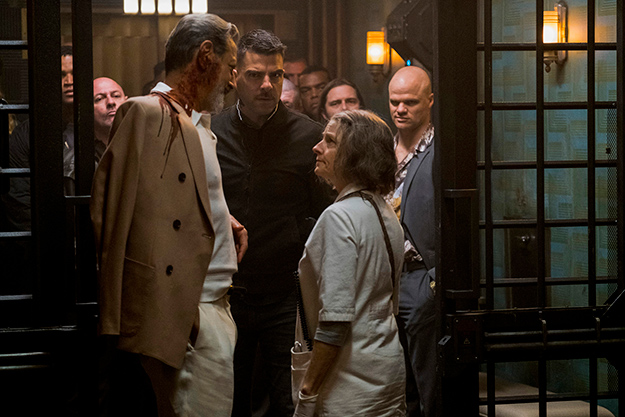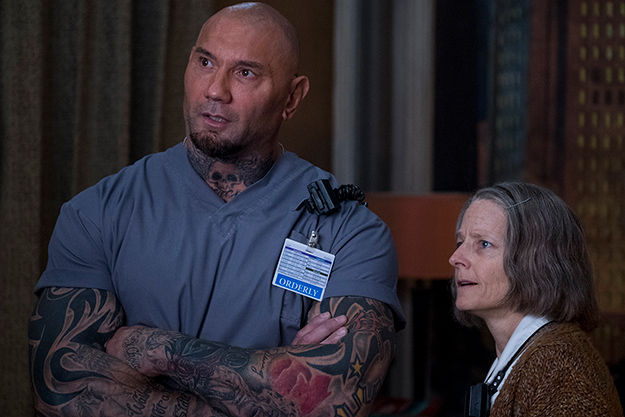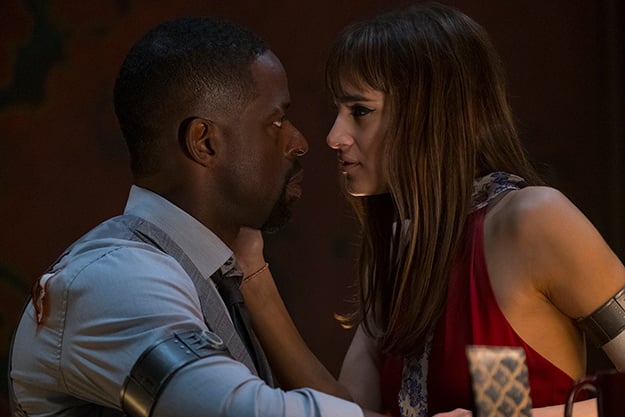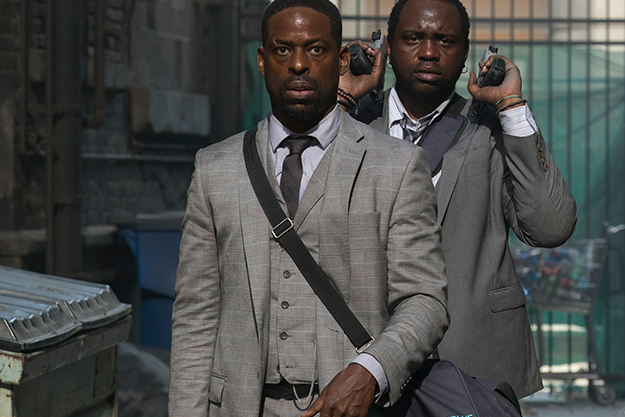Drew Pearce’s debut as a writer-director is not merely a lemon. It’s a lemon mélange pie of contemporary action, futuristic “world-building,” and high and low cultural references. Pearce probably named his primary location—an exclusive private hospital for gangsters in a converted Art Deco hotel—after the goddess Artemis, deity of the hunt, wild animals, and childbirth. His heroine, the Nurse (Jodie Foster), has healed assassins and crooked manhunters for 22 years, and following the trauma of losing her only child, she has rarely left the downtown L.A. building since then. My mind kept flipping to Artemus (sic) Gordon, the gadget-master of TV’s Wild Wild West, partly because the Nurse wields newfangled medical gizmos (such as a 3-D organ printer), and partly because the L.A. we see on Wednesday, June 21, 2028, the movie’s highly specific kick-off date, really is The Wild Wild West. Public services have been privatized. The masses violently protest the water company for cutting off the city’s supply. And the new police force, ProShield, can’t control the rioters. Until now, like a SoCal medical cousin to the Continental in John Wick, Hotel Artemis has functioned as a refuge from and reflection of its L.A. home. It’s a melting pot for upscale felons. Once inside, they take on the names of penthouse suites called “Honolulu,” “Nice,” or “Acapulco,” after chic 1920s resort cities depicted on the murals in each room. The Nurse gradually realizes that this is not a typical Wednesday at the Hotel Artemis. By day’s end her customers break her regulations. She herself admits a wounded “community liaison” police officer (Jenny Slate) solely for sentimental reasons—the cop was a childhood friend of the Nurse’s son. The guests even disrespect our heroine’s cardinal rule: thou shalt not kill other patients.
The movie rises or falls on the depth of our attachment to Foster’s Nurse. She spins the Mamas and the Papas’ “California Dreamin’” on her turntable when she awakens, then listens to Buffy Sainte-Marie sing Neil Young’s “Helpless” on a portable tape deck as she pads through morning rounds. She wears sensible sneakers and Clark Kent glasses, and drapes a nubby, tawny cardigan over her white uniform, which has as many pockets as a safari jacket. To Slate’s disbelieving cop she contends, “There’s plenty of people out there to patch up the good guys.” (She’s wrong: there aren’t.) Unfortunately, an attempt at a “grabber” opening delays the appearance of the Nurse and misleads the audience about the film’s mini-dystopia genre. The brothers and armed larcenists who will soon be known as Waikiki (Sterling K. Brown) and Honolulu (Bryan Tyree Henry) stage a bank heist in the middle of an urban melee. Their safecracker can’t open the vault, but the customers look to them, they say, like “maids or grass-cutters,” carrying satchels of valuables their rich employers hope to sock away from rioters. Telling these service people to empty their bags is a clever move on the robbers’ part. But it’s cringe-worthy, too. When one menial indicates that his boss is a decent person, the thieves give him a patronizing “good for you.” A fountain pen snagged from a customer’s suit jacket is actually a long, thin mini-jewelry-vault that expands vertically, with a twist of its cap. It’s this film’s vacuous MacGuffin. The post-robbery shootout leaves Honolulu with multiple wounds and a perforated liver that compel Waikiki to call for the Nurse. The sequence amounts to Bang Bang, Bang Bang (there’s no “Kiss Kiss” in the entire movie). Simply introducing Waikiki and Honolulu pounding on the bars of the hotel’s entrance cage would have intensified our identification with the Nurse. Pearce’s previous top credit was co-writing Iron Man 3. In Hotel Artemis he suffers from beginner’s jitters and bad judgment. He packs the 96 minutes with as many featured characters as an Avengers film. We have no immediate affinity for any of them, so he constantly alludes to wispy dramas from their pasts. Waikiki had gone straight until his addict brother persuaded him to partner on that predictably doomed last heist. He and Continental hit-woman Nice (Sofia Boutella) share a vague romantic history. Their mutual respect is more concrete. As Waikiki says, “I’m a professional, but this lady is the business.” In a wry blink at the movie world today, Nice boasts all the bells and whistles that allow her to go “international,” just like an IMAX action movie, including an implant in her eye that simulcasts her hits to her employers for immediate proof of completion. Waikiki works only “domestic.”
Acapulco (Charlie Day), an antsy, anxiety-ridden arms dealer, considers himself a cut above the hotel’s other clients. He tells Nice, “You’re a housemaid with a gun, but I own the fucking mansion.” When Nice says she takes on “important” targets, could she possibly mean this little twerp—this macho wannabe and never-will-be? As writer and director, Pearce hoards narrative. His main storyline can’t withstand the accumulated pressure of his subplots. The film reaches critical mass, or mess, when Zachary Quinto shows up as Crosby, a super-intense thug with Oedipal issues. (“Crosby” must be a joke name, riffing on laidback 1930s superstar Bing.) He insists that the Nurse waive her first-come, first-served rule and instantly accommodate his dad, the “Malibu mob” chieftain known as the Wolf King. (It’s Jeff Goldblum, applying his satiric smarm to pitifully few scenes). She does, of course, because the Wolf King founded and funds the Hotel Artemis. The movie accentuates the negative en route to an absurd, pseudo-uplifting ending. Whenever Foster goes into mission mode, speaking rapidly and punctuating talk with quick, efficient gestures, she has fun with the Nurse’s eccentricities. Her eyes spark when she tries to speed up the action by crying out, “Chop, chop.” But too often Pearce catches Foster lost in melancholy memories or staring crestfallen at a picture of her child. The star can’t camouflage the Nurse’s stick-figure construction or inject enough emotional oomph to activate our heartstrings.
Pearce showcases Boutella’s martial artistry as Nice in the obligatory slash-and-dash scene. Former wrestler Dave Bautista, though, is the one who gives the performance of the movie as the Nurse’s bodyguard/bouncer/orderly, aptly named Everest. Even more endearing here than as Drax the Destroyer in the Guardians of the Galaxy films, Bautista riffs on the idea of a “gentle giant.” He’s tender to the Nurse, merciless toward everyone else, and proud to be “a medical professional.” Except for a fresco of Los Angeles done in wild nocturnal colors, the hotel murals are as sketchy as the characters. Pearce keeps tossing in promising visual concepts like resort-themed rooms, but he lacks the filmmaking skill to keep them vital. The soundtrack is lively, especially with its 1960s source music. The movie most closely resembles a song Pearce didn’t or couldn’t use: the Eagles’ 1977 hit “Hotel California,” with its “voices down the corridor” and people who “are all just prisoners here, of our own device.” Hotel Artemis is too clotted to get our blood racing and too prosaic to be mesmerizing. Pearce flashes all sorts of surgical tools and widgets, but like the knife-slingers in the song, “he just can’t kill the beast.” Michael Sragow is a contributing editor to Film Comment and writes its Deep Focus column. He is a member of the National Society of Film Critics and the Los Angeles Film Critics Association, and a contributor to the Criterion Collection.



